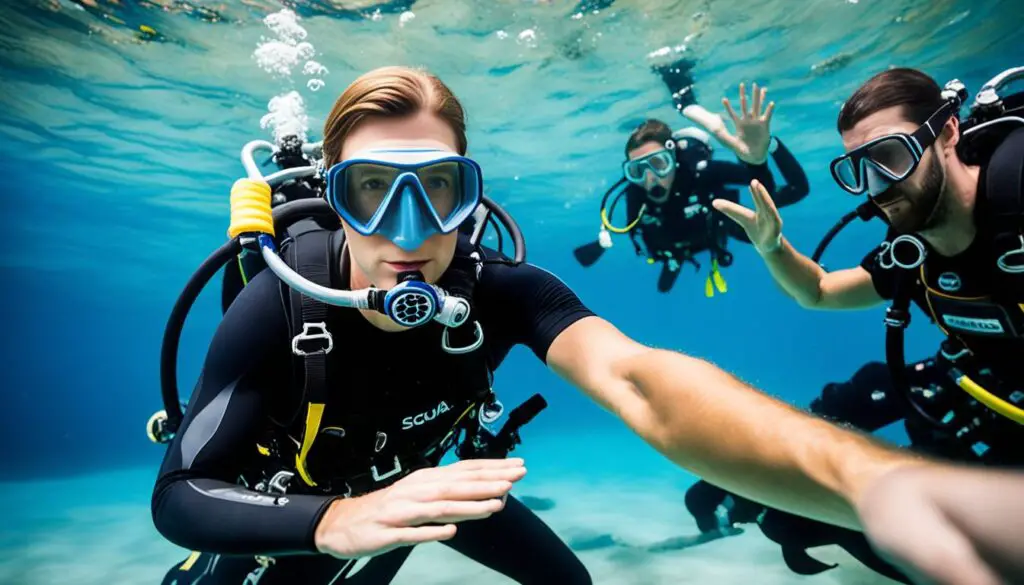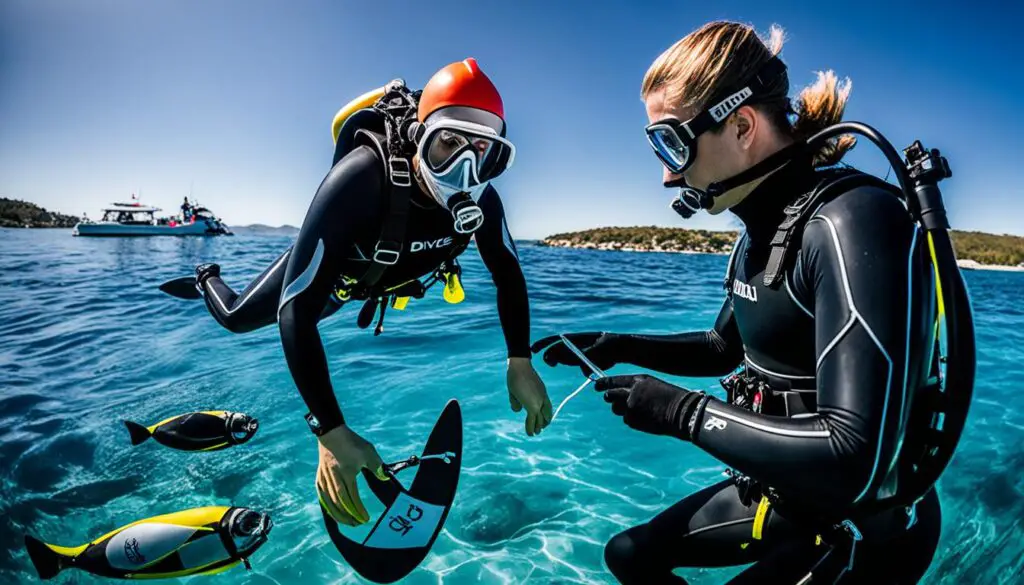Are you starting your journey into scuba diving and the wonders below? It’s a thrilling adventure that promises new discoveries. But, learning about diving care is crucial for a safe, fun dive.
1. Do Pre-Dive Safety Checks: Check your gear thoroughly before each dive. Confirm your mask, fins, and other gear are in good shape. Also, ensure your tank is filled to the right level.
2. Dive with a Buddy: Having a dive buddy makes the experience better and safer. In emergencies, your buddy can help. Make sure you both understand the communication signals.
3. Equalize Your Ears: Ears feel pressure as you go deeper. It’s crucial to equalize often to avoid discomfort. Pinch your nose and blow gently, like on a plane.
4. Learn Buoyancy Control: Good buoyancy keeps you safe and helps protect marine life. Make sure you can stay still in the water without touching the seabed or reef.
5. Show Respect to Marine Life: Remember, you’re a visitor in the sea. Be mindful not to touch or disturb marine animals. Keep your distance to avoid harm.
Key Takeaways:
- Check your equipment before each dive for safety.
- Diving with a buddy is more fun and safer.
- Regularly equalize your ears to prevent pain.
- Control your buoyancy well to protect sea life and enjoy diving more.
- Always respect the marine environment by not touching or harming it.
Why Scuba Diving Training is Essential for Beginners
When you start with scuba diving, safety comes first. It’s critical for beginners to learn the necessary skills and knowledge. This ensures safety during dives and makes the experience enjoyable. Scuba diving courses offer the needed preparation.
These courses are made for new divers. They teach everything from the basics of diving to how to use the gear. Learning underwater communication and safety rules is also key. In these training programs, you gain skills that make diving better and safer.
Having a skilled instructor’s guidance is a huge plus. They’re experienced divers trained to help beginners. They make sure you know the essentials, like dive planning and how to use gear safely.
Diving practice happens in safe places like pools. This lets you get comfortable with the gear and ready for real dives. You’ll face different underwater situations. This hands-on time boosts your skills and confidence for harder dives later on.
Getting certified matters a lot for new divers. It shows you’ve learned the basics and can dive safely. Divers need this certification to rent gear and join dive trips. It’s key to pick a teacher who focuses on safety. They’ll help make your learning experience positive and thorough.

To sum up, scuba diving courses are a must for new divers. They teach you how to stay safe and communicate underwater. The training preps you well for the wonders of diving. With a certification from a recognized course, you’re ready for amazing diving experiences.
Common Mistakes to Avoid for First-Time Divers
For new divers, safety is key. Knowing about common diving mistakes is important. By steering clear of these errors, diving will be fun and safe. Keep these tips in mind:
1. Skipping Proper Equipment Checks
Ignoring scuba gear checks is a major mistake. Before diving, make sure your equipment works well. This includes your mask, regulator, and buoyancy compensator.
2. Ignoring Diving Depth Limits
Exceeding beginner depth limits can be dangerous. It might cause decompression sickness. Stick to the training’s depth rules and stay within your comfort and experience level.
3. Poor Buoyancy Control
Being able to manage your buoyancy is vital. It’s for your safety and the marine life’s protection. Learn buoyancy techniques during your practice for stable and eco-friendly dives.
4. Separating from Dive Buddy
The buddy system is scuba diving’s golden rule. Never dive alone. Keep close to your dive buddy to help each other in case of an emergency.
5. Overexertion and Panic
Feeling overwhelmed underwater can lead to overexertion or panic. This is dangerous. Always keep calm and control your breathing. Let your dive buddy know if you’re struggling.
“The most memorable dive trips happen when beginners dive with a sense of curiosity rather than fear. Be mindful of potential mistakes, but remember to enjoy the beauty of the underwater world!”
Know these diving mistakes and take steps to prevent them. Safety is always the priority. Get the right training and keep learning. This way, you’ll enjoy diving safely and see amazing things under the sea.

Conclusion
Scuba diving is both thrilling and fulfilling for new divers. It’s crucial to learn how to care for your gear, receive proper training, and not make common mistakes. Ensure your dive is safe and fun by respecting the ocean world, staying safe, and diving with a friend.
Get ready to dive in and have wonderful adventures with the right know-how. You’ll see amazing marine life, find hidden wonders, and witness the sea’s beauty. Dive anywhere, from tropical seas to local spots, and the excitement begins.
Always check your gear, maintain your floating balance, and talk well with your dive partner. These steps keep you safe and protect the sea for others. So, prepare to explore, enjoy, and cherish unforgettable moments under the sea!
FAQ
What are some essential diving care tips for beginners?
If you’re a beginner, taking a certified scuba diving course is key. Pick an instructor with lots of experience. Always put safety first.
Dive with a buddy and respect ocean life. Use your equipment correctly and follow safety rules closely.
Why is scuba diving training essential for beginners?
Training is crucial for your safety and that of others. Courses teach you about gear, safety, and talking underwater. An experienced instructor can help you gain confidence.
Getting certified lets you rent gear and join diving trips.
What are some common mistakes to avoid for first-time divers?
Dive safely from the start. Learn how to equalize your ears right and don’t go up too fast. Never dive if you’re not ready for it.
Don’t touch or harm sea creatures. Stay alert and follow the rules for a better dive.
